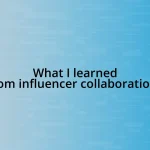Key takeaways:
- Unforeseen challenges can lead to personal growth and resilience when approached with calm assessment and curiosity.
- Identifying one’s response style (avoidance, attack, acceptance) is crucial for effectively managing unexpected situations.
- Building a support network and fostering consistent communication can provide essential insights and relief during tough times.
- Implementing continuous improvement techniques, such as regular reviews and adaptive thinking, enhances problem-solving and team collaboration.
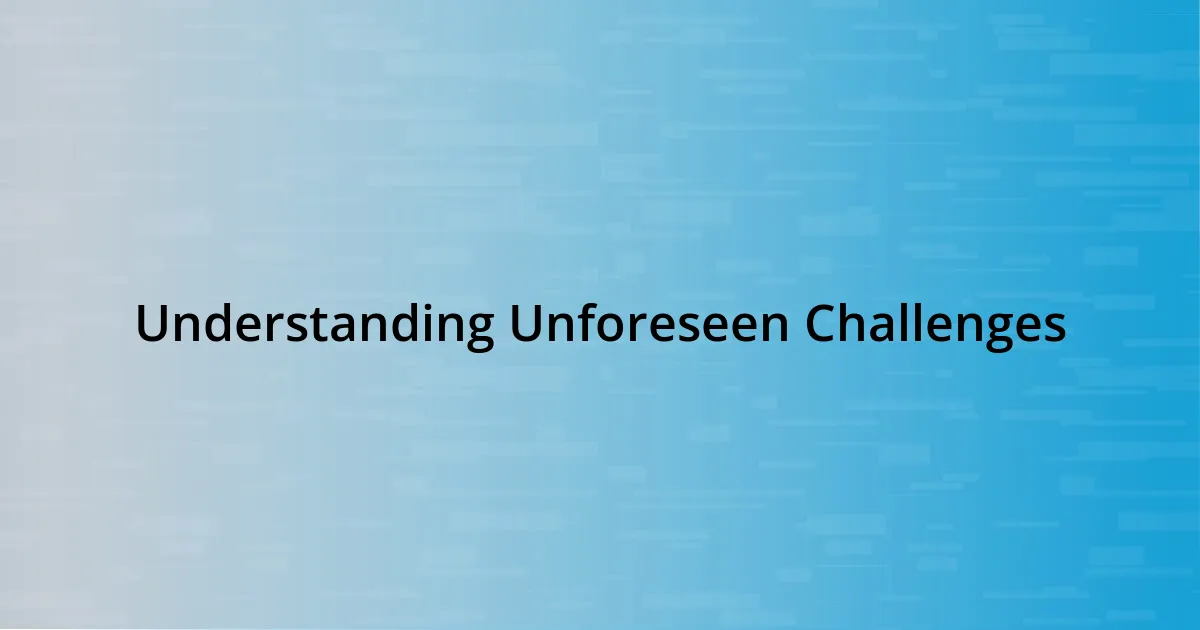
Understanding Unforeseen Challenges
Unforeseen challenges can feel like sudden storms that disrupt our carefully laid plans. I remember a time when I set out for a weekend trip, excited and organized, only to be met with a flat tire just as I was pulling onto the highway. In moments like these, I’ve learned that instead of panicking, it’s often most beneficial to pause, breathe, and assess the situation calmly. How often do we let initial panic cloud our judgment?
These challenges serve not only as roadblocks but also as unexpected teachers. After my tire incident, I not only learned how to change it but also developed a newfound appreciation for the importance of preparation and flexibility. Have you ever found that an obstacle you faced helped you grow in ways you hadn’t anticipated? It’s fascinating how a moment of frustration can lead to personal development and greater resilience down the road.
Understanding these surprises in life means accepting that discomfort often precedes growth. I’ve come to realize that the emotions tied to unforeseen challenges—stress, anxiety, even excitement—are part of a larger narrative about our capabilities. Each encounter adds a layer to our experience, shaping who we become as we successfully navigate the unpredictability of life.

Identifying Your Response Style
Identifying your response style to unforeseen challenges is crucial for personal growth. In my own life, I’ve noticed that I tend to react to surprises with a mix of curiosity and determination. For instance, when I unexpectedly lost a job I loved, my initial instinct was to explore new opportunities rather than dwell on the setback. This approach allowed me to pivot quickly and ultimately discover a passion I never knew I had. How do you respond when faced with an unexpected challenge?
Understanding whether you respond with avoidance, attack, or acceptance can greatly influence your ability to handle unforeseen challenges. I remember a time when I was faced with a sudden deadline change at work. Instead of shying away or getting aggressive, I communicated openly with my team and collaborated on a solution. This not only eased the tension but fostered a stronger bond among us. What would happen if you tried a more engaging approach next time?
To truly identify your response style, it helps to take a moment for reflection. I often journal after challenging experiences to track my feelings and reactions. This practice has allowed me to see patterns that inform how I can better respond in the future. Recognizing my habits has been a game changer in developing resilience. Have you thought about how your responses might evolve with self-awareness? Each challenge unveils a bit more of who we are.
| Response Style | Description |
|---|---|
| Avoidance | Steering clear of challenges and hoping they resolve on their own. |
| Attack | Reacting impulsively, often leading to conflict or heightened stress. |
| Acceptance | Embracing the situation and seeking constructive paths through it. |
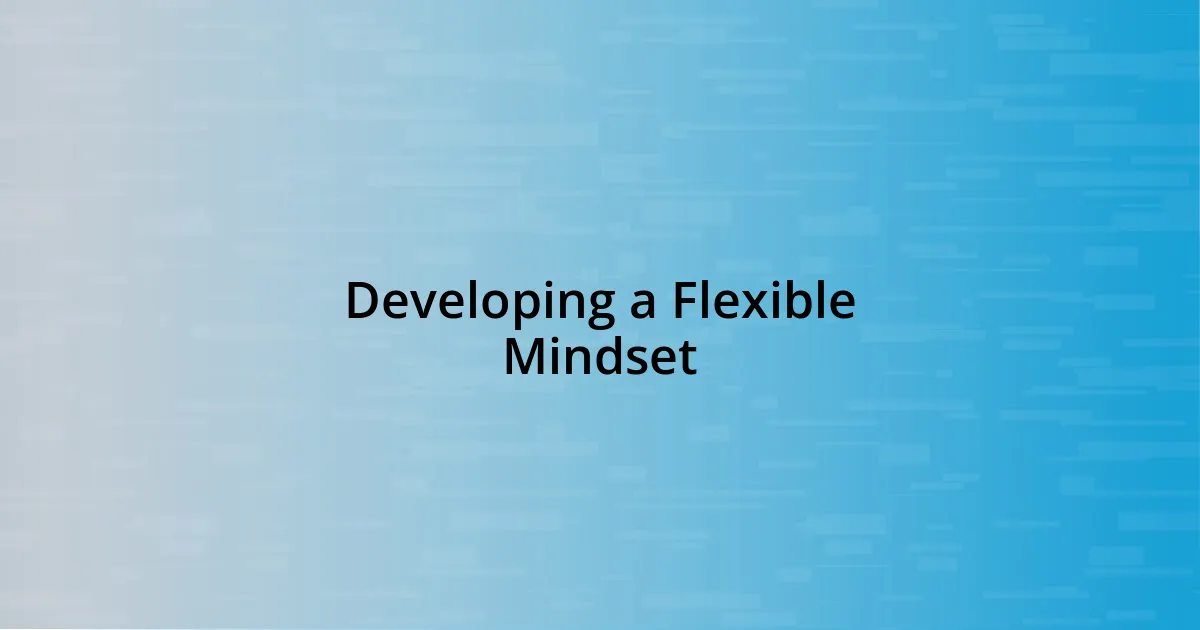
Developing a Flexible Mindset
Developing a flexible mindset is essential in mastering the art of handling unforeseen challenges. I’ve found that when I remain open to different outcomes, I can approach difficulties with a sense of adventure rather than dread. For example, I once missed a flight due to an unexpected traffic jam. Instead of allowing frustration to take over, I explored the airport’s shops and cafes, turning what could have been a waste of time into an enjoyable mini-adventure. This shift in perspective can truly make all the difference.
Here are some practical tips to cultivate that flexibility:
- Embrace uncertainty as a chance to grow. Every setback is an opportunity to learn something new about yourself or your environment.
- Practice adaptive thinking. Ask yourself, “What are my options?” whenever faced with an unexpected hiccup.
- Welcome change and see it as an opportunity for innovation. I often find that the most creative solutions come when I’m pushed outside my comfort zone.
- Cultivate mindfulness. A few moments of deep breathing can help center your thoughts and lead to clearer decision-making.
- Keep a journal to reflect on your responses to challenges. Recognizing patterns helps foster a more flexible approach to future circumstances.
By actively working on these strategies, I’ve come to appreciate that flexibility in mindset isn’t just about responding to change, but also about embracing it. It transforms challenges into stepping stones, enriching my life in ways I never imagined possible.
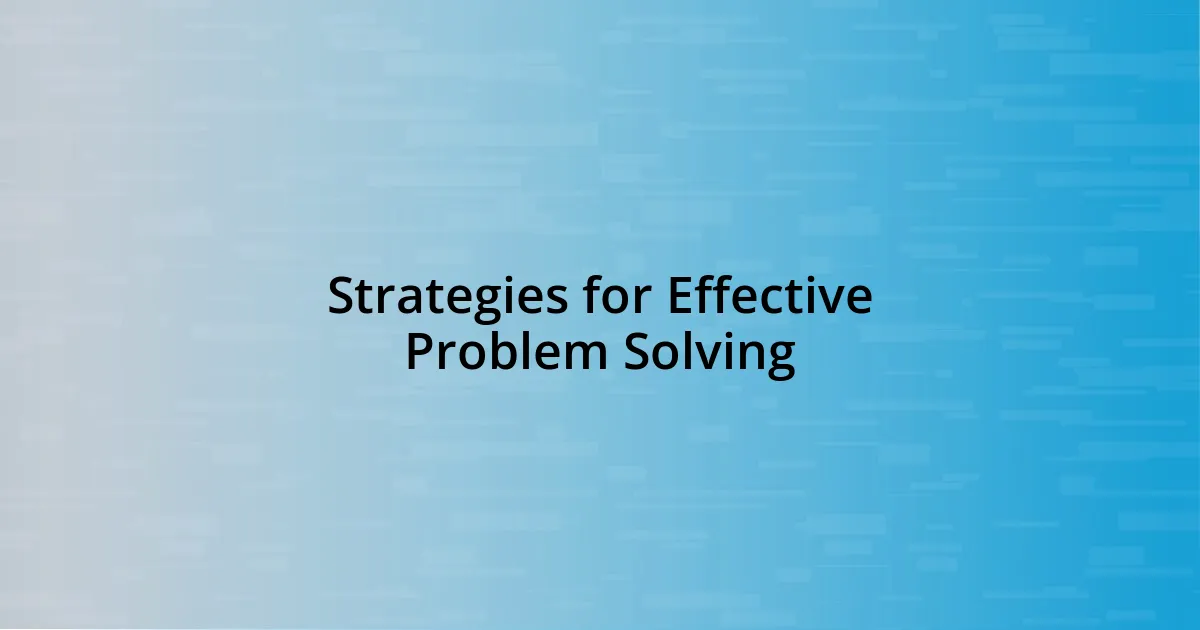
Strategies for Effective Problem Solving
When tackling unexpected challenges, breaking down the problem into smaller, manageable components can be incredibly effective. I remember a time when I had to prepare for a presentation with only two days’ notice. Instead of being overwhelmed by the enormity of it, I focused on creating an outline first, which helped me piece together my thoughts and ideas coherently. Isn’t it interesting how simplifying a seemingly daunting task can make it feel achievable?
I often find that involving others in the problem-solving process not only brings fresh perspectives but also lightens the emotional load. During a recent community project, we faced a last-minute budget cut. Rather than stressing in isolation, I gathered my team for a brainstorming session. The open dialogue led to innovative fundraising ideas we hadn’t considered before. Have you ever noticed how collaboration can breathe new life into a problematic situation?
Another strategy I swear by is not shying away from seeking feedback. I vividly recall a time when I was uncertain about a decision I had made at work regarding project deadlines. I hesitated to reach out to my supervisor, fearing judgment, but when I finally did, her insights provided me clarity and confidence. This taught me that asking for help is a strength, not a weakness. How often do you undervalue the wisdom of others when facing uncertainties? Always remember, sharing your challenges can illuminate pathways you might not see on your own.
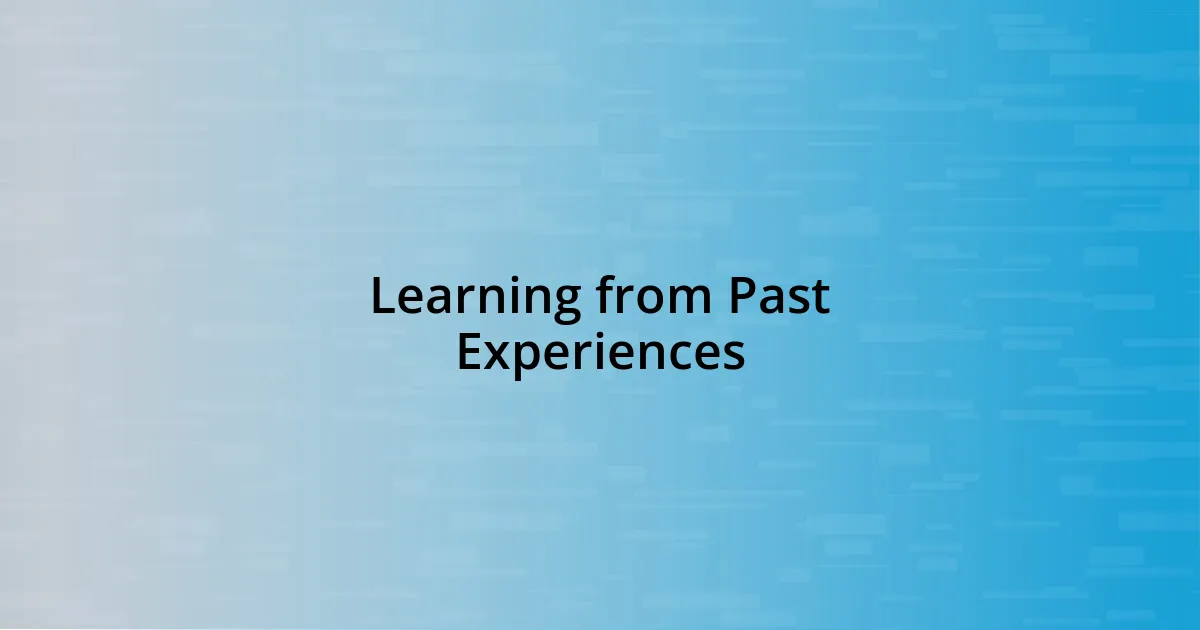
Learning from Past Experiences
Reflecting on past experiences is a cornerstone of personal growth. I remember a time when I started a new job and felt completely out of my depth. Instead of letting that fear paralyze me, I recalled past roles where I had similar feelings. By applying the lessons I learned back then—like asking questions and seeking help—I managed to find my footing fairly quickly. Isn’t it fascinating how our past can be a guiding beacon when faced with the unknown?
Each challenge I encountered has been a stepping stone toward greater resilience. Once during a particularly chaotic week, I faced several unexpected delays in a project. My initial instinct was to panic, but I took a moment to analyze similar situations from the past. I remembered how I successfully juggled conflicting priorities by creating a priority list. Harnessing that experience allowed me to regain control and ultimately meet the deadline. How often do we overlook our previous successes when confronted with new obstacles?
Additionally, journaling about these experiences has proven invaluable for me. After navigating a tough personal challenge, I took the time to write down what I learned. I found that putting my thoughts onto paper not only clarified my takeaways but also highlighted recurring patterns in my reactions and decisions. It was an eye-opening moment that reinforced the idea that each setback carries a lesson if we’re willing to reflect upon it. Have you ever considered how a simple habit like journaling could transform your understanding of your challenges? Trust me, the insights I’ve gained have made facing the future a lot less daunting.

Building a Support Network
Building a support network is essential for navigating life’s unpredictable twists and turns. I once found myself in a tough spot when a personal crisis hit, and I realized that I hadn’t leaned on my friends as much as I should have. When I finally reached out to a close friend, their unwavering support and willingness to listen transformed my outlook. It’s incredible how sharing our burdens with someone else can lighten the load—have you ever felt the relief that comes from just talking things through with someone you trust?
Establishing meaningful connections isn’t just about having friends available; it’s about nurturing those relationships. I make it a point to regularly check in with my network, whether through texts or coffee catch-ups. Recently, during a stressful job transition, I was surprised by how my former colleagues offered their insights and encouragement without hesitation. This reminded me that the roots of a strong support system thrive on consistent communication. Do you consciously maintain your support network, or do you wait until you need help?
Moreover, diversity in your support network can be a game changer. In my experience, having friends from different walks of life enriches my perspective. For instance, when facing a particularly challenging decision, I turned to a friend in the creative field. Their unique approach to problem-solving opened my eyes to possibilities I hadn’t considered. This showed me that insights can come from the most unexpected places. How often do you seek advice from those who think differently than you? Their viewpoints might just spark the solution you need when challenges arise.
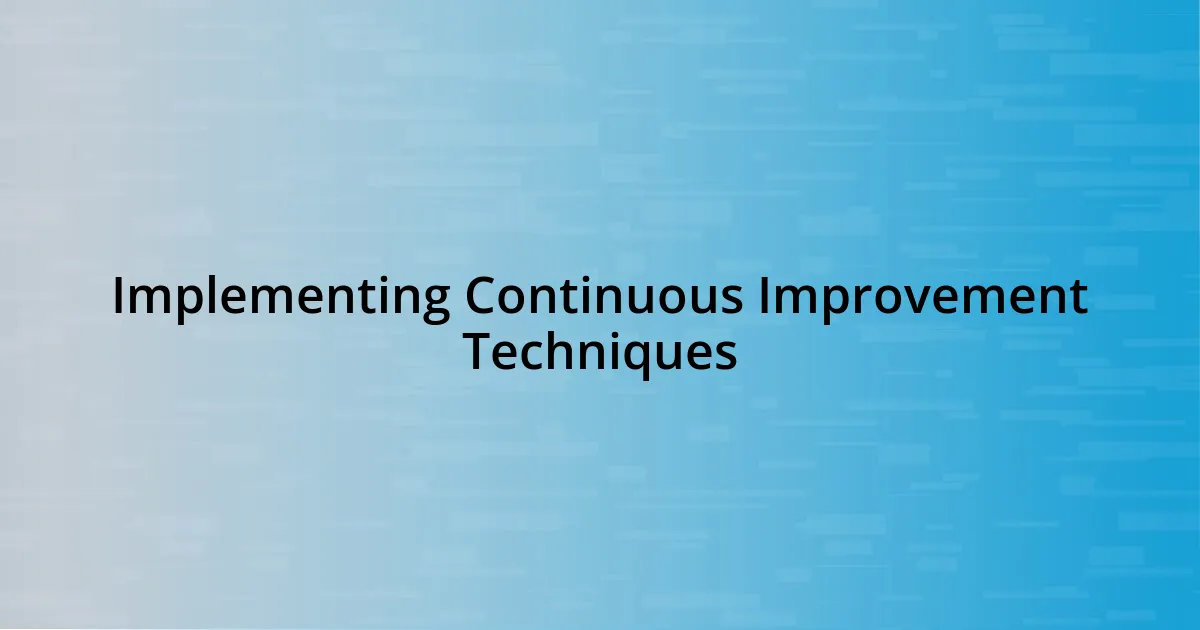
Implementing Continuous Improvement Techniques
Implementing continuous improvement techniques has become a fundamental part of my approach to dealing with unforeseen challenges. I remember a daunting project where I thought I had everything planned out, only to be met with unexpected hurdles. Instead of letting frustration take over, I gathered my team to discuss what went wrong, fostering an open environment for feedback. This discussion not only unveiled areas for improvement but also strengthened our collaboration. Have you ever found that sharing insights can transform a setback into an opportunity for growth?
One powerful technique I’ve embraced is the practice of regular reviews. After a major project, I dedicate time to reflect on what worked well and what didn’t. It was during one such review that I discovered a recurring theme: my team often struggled with miscommunication regarding deadlines. By addressing this, we implemented clearer timelines and check-ins. Since then, we’ve not only improved our workflow but also built a stronger team dynamic. Do you see the value in taking time to evaluate your processes, or do you often rush forward without reflecting?
Another approach I’ve found effective is adapting lean methodologies. I once took part in a workshop that focused on the concept of eliminating waste in processes. I was skeptical at first—could this really help in a chaotic work environment? But applying these principles to my daily tasks allowed me to streamline workflows and prioritize better. I often think back to that workshop when I feel overwhelmed. It taught me that small changes can lead to significant improvements. Have you considered how a systematic approach to your routine could alleviate stress and improve efficiency? The difference can be remarkable.








